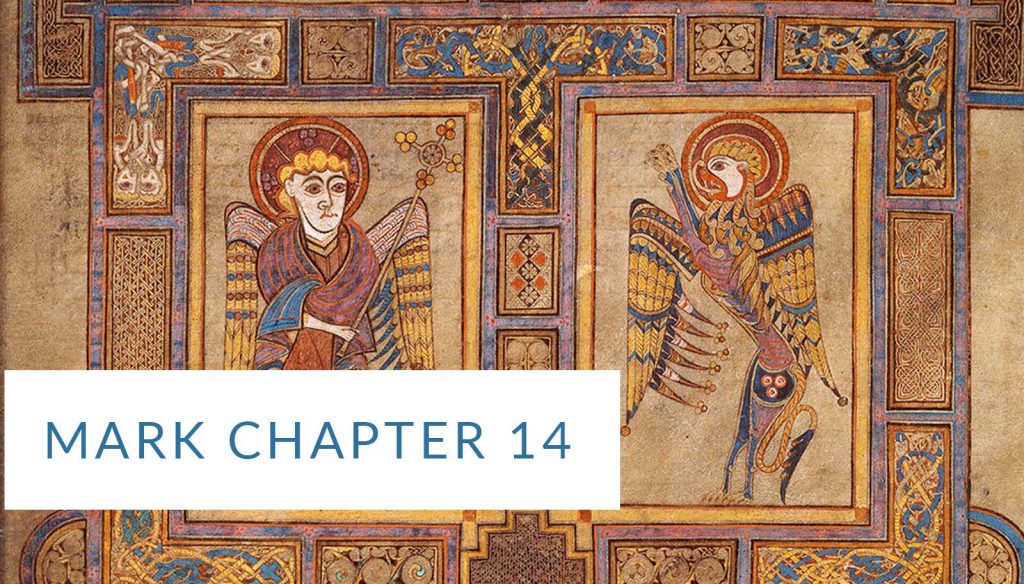This week’s readings are all from Mark chapter 14. Click here to see a full listing of each day’s reading and the full chapter of Mark 14. Full readings of each day’s smaller segments of the readings will be posted on this site during the week.
Today's Reading
Two days before the Passover and the Feast of Unleavened Bread, the chief priests and the experts in the law were trying to find a way to arrest Jesus by stealth and kill him. 2 For they said, “Not during the feast, so there won’t be a riot among the people.”
3 Now while Jesus was in Bethany at the house of Simon the leper, reclining at the table, a woman came with an alabaster jar of costly aromatic oil from pure nard. After breaking open the jar, she poured it on his head. 4 But some who were present indignantly said to one another, “Why this waste of expensive ointment? 5 It could have been sold for more than 300 silver coins and the money given to the poor!” So they spoke angrily to her. 6 But Jesus said, “Leave her alone. Why are you bothering her? She has done a good service for me. 7 For you will always have the poor with you, and you can do good for them whenever you want. But you will not always have me! 8 She did what she could. She anointed my body beforehand for burial. 9 I tell you the truth, wherever the gospel is proclaimed in the whole world, what she has done will also be told in memory of her.”
10 Then Judas Iscariot, one of the twelve, went to the chief priests to betray Jesus into their hands. 11 When they heard this, they were delighted and promised to give him money. So Judas began looking for an opportunity to betray him. (Mark 14:1-11 NET)
Podcast(s) for this Reading
Mark 14 Part 1: Verses 1-27
Parallels in Other Gospels and New Testament Writings
The commentary I read related to todays reading, indicated that the primary objector to the “waste” of the expensive perfume was Judas. It goes on to remind us the Judas was the treasurer and keeper of any and all funds donated to support Jesus and his disciples. Alas, “the fox guarding the hen house”. Judas was embezzling money from the treasury to enrich his personal life. The commentary goes on to indicate that this scene pushed Judas over the edge as Jesus told his followers that it was a righteous thing to have the perfume used to prepare Jesus for the burial ahead. Judas realized that Jesus was not his ticket to personal wealth and therefore went to the authorities to betray Jesus…but more importantly, to receive payment for what he did. I don’t believe Judas was ever on board or understood the roleJesus would play for all of humanity.
The commentary I read related to todays reading, indicated that the primary objector to the “waste” of the expensive perfume was Judas . . . The commentary goes on to indicate that this scene pushed Judas over the edge as Jesus told his followers that it was a righteous thing to have the perfume used to prepare Jesus for the burial ahead.
John's Gospel mentions that it was Judas who voiced the issue and also mentions his own greed and dishonesty:
But Judas Iscariot, one of his disciples (the one who was going to give him over) said, “Why wasn’t this oil sold for 300 silver coins and the money given to the poor?” (Now Judas said this not because he was concerned about the poor, but because he was a thief. As keeper of the money box, he used to steal what was put into it.) (John 12.4–6 NET)
However, there's nothing in the text to indicate that this anointing was the event that "pushed Judas over the edge." That's an interesting interpretation. Here's a link to the parallel story in all four gospels.
Mark's emphasis is that it was a group of disciples (plural) who had issue with the woman:
But some who were present indignantly said to one another, “Why this waste of expensive ointment? 5 It could have been sold for more than 300 silver coins and the money given to the poor!” So they spoke angrily to her.
The first of two podcasts on Mark 14 is now available. In this episode, we cover Mark 14:1-27:
Every time I read this passage, I am always drawn to Judas. What must he have been thinking? What must have been going on in his heart?
